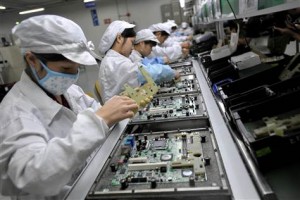Today’s post comes from guest author Ryan Benharris from Deborah G. Kohl Law Offices in Massachusetts. The post is commentary about a blog post that firm owner Rod Rehm wrote last year, but I find it very timely. Sometimes it seems like the march to outsource is overwhelming. With that outsourcing comes increased profits for companies and “better” jobs for workers, but sometimes the cost is also really high.
There have been recent news stories about unsafe working conditions that caused building collapses or fires in garment and poultry processing factories. One of the more recent fires was made even the more tragic when almost all of the exits were locked. Even with these dangerous working conditions, it seems like there’s a story a month about more jobs moving overseas, whether in technology or manufacturing.
But Mr. Benharris prompts us to consider the cost of these cheap goods. It also seems that the big-picture of all costs — human, transportation, and manufacturing — for making a product are starting to be considered. Mr. Rod Rehm recently wrote in a blog post, “Good News for American Workers” about manufacturers taking a second look at the United States to produce or assemble products. And I hope that China’s Lenovo company opening an assembly plant in North Carolina is the start of a trend that leads to both foreign and United States companies recognizing the value that can be gained through decreased transportation costs and the goodwill that can be gained by operating with higher safety standards by locating manufacturing and assembly jobs in the United States.
Our colleague Rod Rehm shared a great post about Apple’s inhumane factory working conditions in China the other day. It gave us pause because we use Apple products in our business all the time. Whether it’s an iPhone to keep in touch with the office 24/7 or an iPad to help win our clients’ cases in the courtroom, these tools have become an integral part of our lives and the lives of hundreds of millions of people across the world. We hope that through advocacy companies like Apple will improve their working conditions and increase standards of living across the globe.
We also hope that as Apple moves to provide better working conditions for all of its workers and subcontractors, it can repatriate many of its jobs cost effectively. In the video linked in Rod’s post, Jon Stewart points out that right now Apple saves about 20% on the cost of production by outsourcing to China. We, as fans of Apple’s products, would be willing to split the difference with them and pay 10% more for their excellent products if they’d absorb the other 10% and treat their workers humanely.
Here’s Rod’s original post (reprinted with permission):
When Henry Ford invented the Model T, he revolutionized manufacturing and in the process created tons of high-paying jobs for ordinary people. His wealth was shared. When Steve Jobs and Apple invented the iPhone, they outsourced its manufacturing to Foxconn, a company that runs assembly lines in China. Aside from a few jobs at company headquarters and some sales and service positions at retail stores, the jobs are all overseas. The vast majority of the profits from the sales of Apple and other companies like it are going to the wealthy people who own Apple stock and a few extremely well-paid executives. Jon Stewart details how life without “burdensome” regulations, “frivolous” lawsuits and labor unions means Chinese workers suffer so U.S. companies can build their products cheaper and accumulate more profits. Stewart’s investigative segment makes us all ask whether it is worth these inhumane conditions so we can get the next gadget for a few dollars less, or to pad the pockets of the wealthy a little more.
| The Daily Show With Jon Stewart | Mon – Thurs 11p / 10c | |||
| Fear Factory | ||||
|
||||


